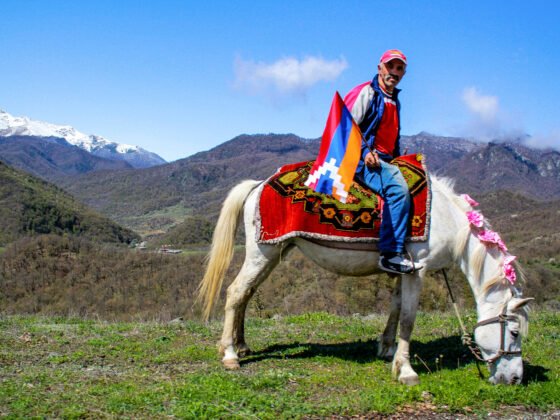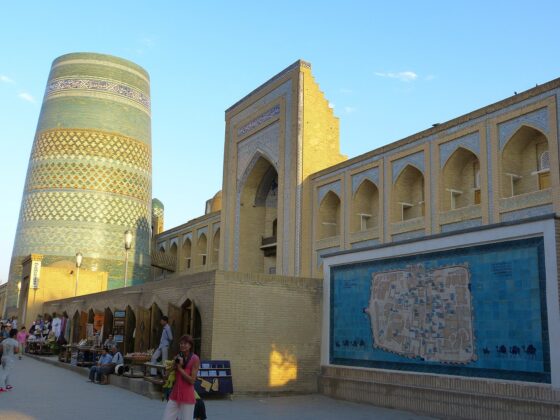Since both countries border Russia and have visa-free entry for Russian citizens, Georgia and Kazakhstan have received many of the Russians fleeing the impact of the full-scale invasion of Ukraine. While a mass exodus of people from a country is nothing unique in human history (nor is the experience of uncertainty and precarity among migrants leaving Russia), what has been unprecedented is the flow of migrants from a former colonizer into those former colonies. While these migrants did not come as colonizers, their colonial identity was front and center in the minds of both host populations.
From the first influx of conscientious objectors and sanctions-dodgers in March 2022, the two countries came to experience Russia’s actions in Ukraine not only as a moral and geopolitical event, but also as one that had immediate consequences and a visible presence in their own countries. Nevertheless, this situation has played out differently in Georgia and Kazakhstan due to differences in the two countries’ language and ethnicity landscapes, their diplomatic relations, and the openness of their public spaces. Georgia’s long-fraught relationship with Russia has allowed more space for direct criticism of the invasion, including public protests and street graffiti. Kazakhstan’s much closer diplomatic ties have made for more muted criticism, though there have been public protests alongside the significant efforts to collect humanitarian aid for Ukraine. Two years on, whereas Russian migrants in Georgia lead largely parallel lives to Georgians, centering their daily activities around institutions seldom used by the host population, migrants in Kazakhstan have largely integrated into society, initiating the arduous process of confronting colonial identities.
Language and Ethnicity
A key point of difference between Georgia and Kazakhstan is that following the collapse of the Soviet Union, most ethnic Russians left Georgia, while many stayed in Kazakhstan. Coupled with this, Georgian was a key language in Soviet Georgia, whereas in Kazakhstan upward mobility depended on speaking Russian. With the influx of migrants from Russia starting in February 2022, language has become an especially important and contentious point of contact between locals and migrants.
Prior to the war, only 0.5% of Georgia’s population was ethnically Russian. The Russian population in Georgia was so minuscule that it remained inconspicuous, and neither the public nor the media crafted any distinct image regarding Russian communities in Georgia. In Kazakhstan, meanwhile, ethnic Russians comprised around 15% of the total population, not counting the substantial share of residents of mixed ethnicity. As a result, the presence of Russians and the use of the Russian language is normalized in Kazakhstan (though not apolitical). Thus, when migrants began pouring across the Russian border, language was politicized differently in the two countries.
In Georgia, language politics has played out in the arena of education and in everyday spaces. Even during the Soviet era, Georgians considered it a point of pride to maintain their titular language as the language of instruction at all levels of education, and the fight against Russification primarily took place in universities and schools. Prior to the war, Russian-language education was seen as a form of Russian soft power, and in November 2022, the Minister of Education stressed that no new Russian-language schools would be opened. However, it is widely known that an increasing number of private Russian-language schools operate without Georgian accreditation. Even the issue of migrant children’s right to state education proved controversial, with some questioning whether the “state should finance [the education of] migrants who are at the same time occupants/occupiers.”
Another contentious arena is what language is spoken on the streets and especially in cafes. A report on Russian cafes in Tbilisi found it was routinely impossible to receive service or find menus in Georgian, citing this as a violation of the law that services must be available in the state language. This report catalyzed negative attitudes and active discussion within Georgian communities. In Georgian cafes, meanwhile, Russians encounter trouble if they use Russian, as many people, especially in the younger generation, simply do not speak that language. Instead, Russians have come to converse predominantly in English, at least in public.
In Kazakhstan, though the use of Russian language is widespread, especially throughout the north of the country and in major cities such as Almaty and Astana, denizens understand the finely nuanced political debate surrounding the Russian language. The generation of Russians born since independence, in particular, sees Kazakhstan as their home, integrates Kazakh traditions and holidays into their practices, and is not oriented toward Russia as a homeland.
When Russian citizens began arriving following the mobilization, ethnic Russian citizens of Kazakhstan had similar reactions to other groups. These included concerns about the impact of Russians on the economy and society, and potential chauvinism. This response on the part of Kazakhstan’s Russians highlighted that ethnic Russians in Kazakhstan are quite different than their counterparts from Russia. In other words, ethnicity is not always the most salient factor of identity; many other factors (attachment to the country as a whole or to a particular region/locale) may be far more important.
Perceptions of the importance of Kazakh language, always in a careful dance with retaining the official status of Russian, increased among all groups following Russia’s invasion of Ukraine. Kazakh language clubs became increasingly popular, among them Batyl bol, created by Aleksey Skalozubov, an ethnic Russian who identifies himself as Kazakh. Because the summer of 2022 was a time of intense reckoning with Russia’s ongoing hegemony and imperialistic overtures, citizens of Kazakhstan, regardless of ethnicity, were sensitive to any perceived arrogance on the part of migrants coming from Russia. Even the proclamations of Russians that they had come to Kazakhstan because they could speak Russian and easily integrate were met with bristling on the part of locals, who were more finely attuned to the real and symbolic importance of the Kazakh language in society.
Indeed, even though Russian is widespread in Kazakhstan, the country’s Russian-language media space has developed independently of Russia. While it is of course possible for most citizens of Kazakhstan to access internet resources from Russia and even Russian state television channels, Kazakhstan has its own Russian-language television, news, and social media space. On a practical level, while citizens and foreigners alike can manage life in either Kazakh or Russian (as both have official status in the country) and foreigners can integrate even if they speak only Russian, the linguistic landscape remains political. Yet the politicization of language occurs in spaces where only a minority of the population is truly bilingual to the extent that the Russian language could be eradicated easily or quickly.
War and Fear of War
Both Georgia and Kazakhstan recognize their precarious place on Russia’s border, given Russia’s historical practice of protecting its citizens and co-ethnics abroad. For Georgia, however, this fear comes with concrete experience of conflict with Russia in the recent past, whereas for Kazakhstan it remains more abstract.
Discussions of Russian migration to Georgia often begin with the reminder that 20 percent of Georgian territory is already occupied by Russia—a reference to South Ossetia and Abkhazia, which were the targets of the 2008 war. In light of this direct experience with war and occupation, the presence of Russians in Georgia takes on an existential tone. Passportization practices in the occupied territory, where Russia has extended passports to Georgian citizens who then become the target of Russia’s efforts to protect citizens abroad, are fresh in the minds of Georgian citizens as they encounter Russian migrants.
During the wave of immigration that accompanied Russia’s September 2022 “partial mobilization,” Georgian media frequently reported on human trafficking along the border between Russia and Georgia. This prompted a fearful response from Georgian society, which was concerned about the possibility of another wave of occupation. The media often expressed concern that the growing Russian minority in Georgia might provide a pretext for Putin to invade the country by claiming the need to protect ethnic Russians or Russian citizens. Surveys conducted among the Georgian population indicate a widespread belief that there is an ever-present threat of renewed conflict that might escalate into war.
Concerns about Russian occupation have become intertwined with questions of economic marginalization. As new Russian communities have sprung up, it has prompted extensive discussion in Georgian society. The general sentiment is that Russians are displacing the Georgian middle class. Many people feel that Georgians are leaving the country due to economic difficulties and Russians are taking their place. Gentrification, soaring property prices, and displacement occasioned by Russian immigration have only exacerbated the situation. Georgian enterprises are being replaced by Russian businesses, and with prices rising, Georgians are finding it increasingly challenging to rent the business spaces and houses they used to.
In Kazakhstan, while both the economic and existential lenses are present, they are perhaps more subtle because Kazakhstan has maintained a close relationship to Russia since the fall of the Soviet Union and has not experienced overt conflict or war with Russia.
Many geopolitically oriented commentators see Kazakhstan’s diplomatic relations with Russia through the lenses of Great Games and Russian hegemony. The view from Kazakhstan is more nuanced. When the Eurasian Economic Union was formalized in 2015, in Kazakhstan it was framed primarily as an arrangement initiated by Kazakhstan’s then-president, Nursultan Nazarbayev. Indeed, Kazakhstan has always asserted its agency vis-à-vis Russia. However, decolonial discourses increasingly complicate this vision of Kazakhstan’s agency, focusing instead on vulnerabilities and hegemonies imposed by Russia. The reality is that vulnerability and agency coexist in Russia and Kazakhstan’s relationship.
The war in Ukraine shows how Kazakhstan uses this positionality creatively and actively to demonstrate its opposition to the war without alienating itself from Moscow by taking a specific stance on the war. The domestic audience is also a crucially important factor in these interactions, driving the postcolonial discourse and national revival sentiment (especially with regard to Kazakh language, but also when it comes to traditional dress and cultural traditions such as holiday celebrations) in academic and social media spaces.
Numerous geopolitical events have been actively discussed by the public in Kazakhstan. These range from the activities of political leaders (for example, Vladimir Putin’s October 2022 visit to Astana and Kassym-Jomart Tokayev’s May 2023 visit to Moscow) to statements by cultural leaders, as when, in November 2022, talking heads on Russia’s First Channel program “Evening with Vladimir Solovyov” warned that the same “Nazi processes” that had forced Russia to intervene in Ukraine could easily start in Kazakhstan. Russian cultural leaders or lower-level political officials occasionally make such statements, stoking fears that the Russian population in Kazakhstan is not safe.
While high-level discussion of the potential for conflict is avoided at all costs, and diplomatic relations continue to be extremely careful, in certain arenas anxiety over Russia’s potential encroachment is evident. One of these arenas is Kazakhstan’s citizenship policy. While Kazakhstan has always rejected the possibility of dual citizenship, this has become especially acute in the past decade: Since the 2014 annexation of Crimea, people found with two passports have been actively prosecuted and in many cases stripped of their Kazakhstani citizenship.
Unlike the issue of language, fears of war remain quite independent of interactions between migrants and locals. Those who fear Russian intervention cannot point to anything more concrete than the types of media statements made above and the experience of countries like Ukraine and Georgia. Public spaces and activism, discussed in the following section, show a mix of these attributes, sometimes bringing migrants and locals into interaction and at other times taking on a life of their own regardless of concrete interactions.
Public Spaces and Political Activism
Given Georgia’s and Kazakhstan’s dramatically different diplomatic relations with Russia, it is no surprise that anti-Russian or pro-Ukrainian expressions in public spaces have developed differently in the two countries. In Georgia, the migration wave was met with a proliferation of graffiti, with the prevailing messages often conveying sentiments like “Russians go home” or “No Russian is welcome, whether good or bad.” In Kazakhstan, while there has been some demonstrable support for Ukraine, anti-Russian sentiment on the streets is carefully controlled and closely monitored by the government.
These differences also manifest in the sphere of activism. In Spring 2022, massive public demonstrations in Georgia offered support to the Ukrainian cause. Protests also centered on criticism of Tbilisi for not joining international sanctions on Russia, which was seen as an attempt to appease Moscow. Unlike their government, the Georgian people demonstrated significant solidarity with Ukraine and its people through a series of rallies on Rustaveli Avenue, as well as engaging in various charity activities. Anti-war activism is also common among Russian emigres to Georgia, even if the activism of Russian and Georgians takes place in distinctly separate spheres.
Public controversy again flared in Georgia when flights to Russia resumed in May 2023 after a four-year ban. The resumption coincided with the European Union, the United States, Canada, and other states banning Russian airlines from entering their airspace. Pro-Western President Salome Zurabishvili protested the restoration of relations with Russia on Twitter and demonstrators greeted the first arriving flights with anti-Putin slogans. When Yekaterina Vinokurova (the daughter of Russian Foreign Minister Sergey Lavrov) attended a wedding in Georgia, it caused an uproar among the Georgian population, leading to the disruption of the wedding, which was being held at one of the country’s most prominent resorts.
In Kazakhstan, though public rallies are generally closely controlled by the government, several pro-Ukraine/anti-war rallies have been allowed, even when not officially sanctioned. However, some activists and protestors have been jailed for their anti-war and anti-Russia activities, including protesting the influx of Russian emigres. While these arrests tend to garner international attention, these restrictions do not deter activists from their activities. Still, most activism happens in quieter spaces or is directed toward activities such as humanitarian aid or boycotting the concerts of pro-war Russian artists.
While activists among the Russian emigre community are probably less likely to go to Kazakhstan than to Georgia, members of the LGBTQ+ community, among others, have integrated into local activist communities to a much greater extent than in Georgia. Because of the marginalized position of activists in Kazakhstan, many communities are multi-profile, for example taking up issues of sexual identity and decolonization. As they navigate these multiple issues, remaining inclusive has been a key value that has benefitted those Russian emigres hoping to integrate.
Conclusion
While Georgia and Kazakhstan share a common lens on Russia, seeing it as a hegemonic actor and colonizer, these attitudes have played out differently at the popular level due to differences in language and ethnicity, experience of open conflict with Russia, and the openness of public spaces to activism.
In response to the unfavorable attitudes of Georgians toward Russian migration, Russians adopt a “secret lifestyle” in the country. Despite their visibly increased presence on the streets, their daily activities occur in areas seldom visited by Georgians: an entire ecosystem of schools, kindergartens, educational centers, clinics, psychological assistance centers, mutual aid centers, entertainment centers, and beauty establishments exist in parallel to Georgian society. As a result, the Georgian population has limited awareness of—or interest in—the lives of Russian migrants. Researchers such as Giorgi Lomsadze and Florian Mühlfried were among the first to observe that despite significant migration, Georgians and Russians have limited interaction, leading largely parallel lives despite the tense context and their physical proximity.
In Kazakhstan, meanwhile, the population has become habituated to the presence of migrants. While there is some evidence from ongoing research that certain pockets of migrants live in isolation, there are also many migrants who have melded into society. This process has been eased by the widespread use of the Russian language in Kazakhstan, as well as by the historical presence of ethnic Russians. Thanks to the greater integration of migrants and locals, the long and arduous process of confronting colonial identities has begun and represents a glimmer of hope in the shadow of war.
Mariam Darchiashvili is Assistant Professor of Anthropology at Ilia State University
(Georgia).
Ketevan Gurchiani is Professor of Anthropology at Ilia State University.
Nikita Mishakov is a PhD student in Eurasian Studies at Nazarbayev University (Kazakhstan).
Caress Schenk is Associate Professor of Political Science and International Relations at
Nazarbayev University (Kazakhstan).
This article has been supported by the Polish National Agency for Academic Exchange
under the Urgency Grants Scheme programme no BPN/GIN/2022/1/00082/DEC/1











